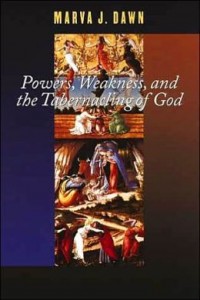 Continuing the series on “Slow Church and the Urgency of Justice” today. This is the sixth post. (Link goes to the initial post in the series). Previous post: “I know something worse than hate…“.
Continuing the series on “Slow Church and the Urgency of Justice” today. This is the sixth post. (Link goes to the initial post in the series). Previous post: “I know something worse than hate…“.
Today’s post is a bit tangential, but I believe it is necessary as we seek to explore Marva Dawn’s understanding of how we as the Church respond to the powers of death and darkness in the world. As I mentioned yesterday, the title of Dawn’s book that I’m digging back into as I write this series is Powers, Weakness and the Tabernacling of God. As part of this series on Slow Church and the urgency of justice, I am primarily interested in the powers and what we are to do about them. However, in order to fully understand Dawn’s work on the powers, we must understand what she means by weakness and the tabernacling of God.
Weakness is essential to our concept of Slow Church. Indeed, part of our slowness comes precisely because we, as humans are weak. Indeed, we set ourselves up for all kinds of distortions of the gospel of Jesus, when we ignore or try to mask our weakness (the macho theology of Mark Driscoll or the political theology of American exceptionalism come immediately to mind for instance). In the Slow Church book, I describe our weakness as a result of the Fall, and particularly how the fragmenting effects of the Fall have impacted our capacity to discern good from evil (this is a thought that is borrowed from the epistemology of John Howard Yoder, who incidentally was Marva Dawn’s PhD advisor at Notre Dame). However, John and I take our weakness mostly as an assumption and do not flesh out what that might mean to the extent that Marva Dawn does. Here is the essence of Dawn’s theology of weakness (in her own words):
Paul proclaims this great fact of the gospel: that in his weakness, Christ was crucified, but that by means of God’s power he continues to live. This is God’s way: that through his astheneia (Greek: weakness) Christ gave himself up to death — totally emptying himself and becoming obedient to the worst of deaths, as the letter to the Philippians asserts (2:5-10). Such a totality of weakness, of perfect submission to the will of the Father (as frequently recorded in the Gospel of John) makes possible the perfection of God’s tabernacling in the world through Christ (37).
Dawn traces this theology of weakness throughout the whole of scripture, a reading that I don’t have the space to fully recount here, but the basic image that she is working from is that God tabernacles in power in our midst as we gather in weakness. It is important to note here the grammar of the oft-quoted phrase from I Corinthians: your (plural) body (singular) is the temple of the Holy Spirit. The Holy Spirit thus dwells primarily in the gathering of Christ’s followers (not in individuals, as we usually are told), and as Marva Dawn emphasizes, the Spirit demonstrates the power of God to the extent that we are abiding in our weakness — and not quenching the Spirit by trying to live in our own feeble human power. I am reminded here again of Micah 6:8 (I will eventually get around to my promised reflection on that verse), and the importance of walking humbly with God (i.e., in our weakness) as part of doing justice and loving mercy.
I’m reminded how timely this conversation about weakness is, falling as it does in the season of Lent, in which the Church has traditionally remembered its weakness. I was also reminded of a pair of sings from Bill Mallonee’s album Jugular, that although not as theologically nuanced as Dawn’s work, emphasize abiding in our weakness:
I’ll close for today with another key quote from Marva Dawn:
Even as Christ accomplished atonement for us by suffering and death, so the Lord accomplishes witness to the world through our weakness. In fact, God has more need of our weakness than of our strength. Just as powers overstep their bounds and become gods, so our power becomes a rival to God. As the Psalms and Isaiah teach us, God’s way is not to take us out of tribulations, but to comfort us in the midst of them and to exchange our strength in the face of them (see Is. 40). By our union with Christ in the power of the Spirit, we display God’s glory (47).
Next time, I will resume our exploration of how we engage the powers of the world.












